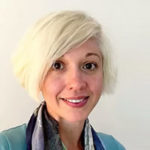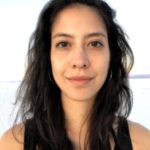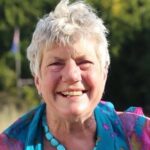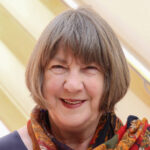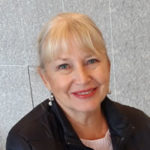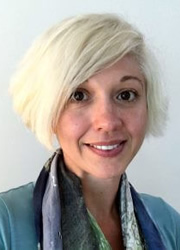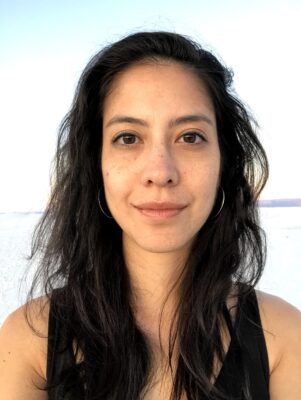- Liz Jackson
- Amy N. Sojot
- Felicity Haynes
- Nesta Devine
- Tina Besley
This interview (link) serves as the introduction to a special issue of Educational Philosophy and Theory (EPAT) that includes a series of interviews with the past women presidents of the Philosophy of Education Society of Australasia (PESA), including Felicity Haynes, Nesta Devine, Tina Besley and Liz Jackson.
Liz: This special journal issue and interview series, which we worked on together, is about women in philosophy of education and PESA, focusing on the experiences and views of the past women presidents of PESA. Readers can learn a great deal about me and my background in philosophy of education in my interview, which is included in this issue. But for readers who are not familiar with you, Amy, can you share a bit about yourself, and what has been your experience with PESA and philosophy of education thus far?
Amy: Of course, although this is a different experience now, being the person asked questions rather than the other way around! I am currently a PhD candidate in the Department of Educational Foundations at the University of Hawai‘i at Mānoa. It was a surprise for me when I decided to seek a doctoral degree. I had never considered a PhD as a possibility, and, to be quite honest, I do not even think I comprehended what a PhD entailed until I was in my master’s program and had PhD students as mentors. I did not do my studies consecutively. Instead, I took a meandering path after receiving my bachelor’s in art history from Occidental College in Los Angeles, California. When I graduated, I worked for a bit in fashion and as a personal assistant to a musician in Los Angeles, and then decided to come back home to Hawai‘i to be with my family. Once here for a while, I did an unexpected job change – me, with an art history degree and who loves the energy of creative fields – when I worked at the Hawai‘i State Legislature as a budget analyst. That position started me on the path to asking critical questions about education. So, it was interesting to read the responses in the previous interviews because they also had other experiences before deciding to go back to school to get their PhD. It felt relatable.
Much like my path to a doctoral program, my participation in philosophy of education was indirect. And again, here I am reminded of the interview responses. I engaged first with continental philosophy, cultural studies and political theory, and applied those to educational questions. Then I met others more directly involved in philosophy of education and was intrigued by their research and the questions they attended to. My first PESA conference was in Rotorua in 2018. Tina Besley was PESA president then, and I believe that is when you [Liz] were elected as vice president. It was exciting to be present for that. As someone who is relatively new to PESA, it was important to me to join this project to learn about the organisation and its history.
PESA was on my radar before then. David Kupferman introduced me to Andrew Gibbons and Marek Tesar (who served as a discussant for a symposium organised by my advisor, Hannah Tavares) at the 2016 American Educational Research Association annual meeting in Washington, DC. Eventually, that led to publication and conference collaborations, including my first Reconceptualizing Early Childhood Education conference in Copenhagen in 2018 for a panel with Andrew and David. It was nice to meet and reconnect with such a warm and friendly group of brilliant scholars there – I still remember Sonja Arndt’s presentation! It was even better to realise I would see many of them again a few weeks later in Rotorua for the PESA conference. I cannot express how much I appreciate the conversations, the connections and the overall supportive spaces that were generated during my first PESA conference. Participating in this project, in a way, facilitated the continuation of those connections and spaces.
Liz: I definitely had similar, positive experiences with PESA that encouraged me to take a larger role after my first conference. While I already knew Michael Peters and Tina Besley from my time as a student at the University of Illinois, I was also delighted, like you, to see what a vibrant and open community PESA is as a whole. Related to your last comment, what made you interested in joining this women’s interview project when I invited you?
Amy: I appreciated the focus of the project. How can we explore and amplify different modes of leadership that diverge from the assumptive visions of a successful leader? Everyone has their own unique style as well as their distinctive interests, and to have the opportunity to ask the past women PESA presidents about their experiences with navigating the role and academia, in general, was something that I found meaningful. I am always curious about processes and strategies: especially as a newer academic, the opportunity to learn – and then to share that with others – from those with more experience navigating these waters is extremely appreciated.
Upon reflection, participating in the project probably reflected a subconscious desire to stave the loneliness, which differed from the generative solitude of scholarly production, as Petar Jandrić has discussed, that has accompanied the physical distancing wrought by the pandemic. Both tragic and disruptive, the past two years have necessitated the initiation of approaches that creatively forge new connections while nourishing existing relationships. The project’s process was interesting because the interviews engaged connection while simultaneously providing a private space for the interviewees to return to their experiences when answering the questions. On another level, we are coordinating between Hong Kong and Hawai‘i. In doing so, the solitary, reflective work is productive and enables meaningful collaboration beyond borders and time zones.
Liz: It is interesting that you mention the pandemic and the desire for connection and reflection. That was an unexpected vein that came through the interviews and actually was an underneath-the-surface aspect of this whole project. Starting around the time the pandemic began, many interviewees commented on appreciating and needing time to reflect as part of the interview process. While the pandemic has been terribly tragic in so many ways, perhaps it facilitated a deeper engagement of all of us in this project, as a means of connection and feeling a part of something when, otherwise, our professional lives have become more isolated.
Amy: I think you are absolutely right. On some level, it feels bittersweet because the tragedy and grief of the pandemic are ever-present. At the same time, we have had the ability to connect with influential women leaders in unexpected ways through the interviews. What comes across very clearly in these conversations is everyone’s commitment, both to doing ethical, meaningful educational research and also to supporting the personal and professional development of others. While this may be a common thread, each person engages with it in their own way. Additionally, the interviews demonstrate the nuanced nature of gendered expectations across generations. Here I am thinking of Felicity Haynessharing ‘that the old obstacles still remain,’ in which the unpaid labour that women perform continues to be a factor. Speaking of nuances, the answers to questions regarding leadership were quite illuminating! Again, there are variations in the interpretations of leadership, yet what remains consistent is that commitment to the field and to one’s relationship with others. These nuanced approaches to engaging leadership are much appreciated because it deepens thin assumptions of what leadership should look like and who should be a leader.
Liz: What else impressed you, and what have you learned, from this project?
Amy: I am exceptionally impressed by the incredible generosity of everyone we have interviewed for their time and the textured richness of their answers. The project has reaffirmed, at least for me, the capacity for conversations to operate as invaluable pedagogical encounters. I relish a good ‘talk story’ session. There is so much to learn during talk story sessions, including the content, the subtext, the tone and even what gets left out of the conversation. Maybe a metaphor could be a publication. At first glance, it is a finished and polished product, when, in reality, it is so much more than that. It has history, it has things that did not quite make it in, and even the ‘final’ piece is not final per se because there are unfinished edges and threads that can prompt further questions.
Liz: This is a great way to put it! I also am fascinated by the stories. In relation to what you have said, the women we interviewed, Felicity, Nesta and Tina, are very distinguished, high-level academics. But, actually, even these leaders of the field identify themselves as works in progress, as practical people and real people, as they might remind me when I would check in about their interview progress while they worked on various other personal and professional projects and made time for this one. So, I love to go ‘behind the curtain.’ You have the wizard, but, underneath the glamour, you have real, down-to-earth, dynamic individuals.
The humility and pragmatism among these distinguished professors were also inspiring to me. You do not have to be this aggressive, obsessively driven woman to ‘make it.’ When I was growing up in the eighties, there was always this stereotype, maybe you have seen it in movies, of the high-powered, dominant woman in the business suit, with massive shoulder pads, who do everything the men can do and is not afraid to have a fight. Our women leaders are nowhere near these stereotypes. They are just lovely people who have lived rich lives. And I was impressed in the interviews that they never strayed from a narrative wherein they were whole humans, not just academics. So, we got to see them beyond their academic webpages. Which is a lovely gift, which makes me feel rehumanised through the experience. Does that make sense to you?
Amy: Yes! It truly is a gift. Each of the women leaders demonstrated how that stereotype insufficiently captures, which, of course, is a function of a stereotype itself, the complexity of experience. Needless to say, I think, on some level, we know this, but, unfortunately, it is necessary to keep on saying and showing it.
Liz: We have deliberately looked at the past as part of this project, in asking women leaders about their professional experiences across generations. But what about the future? When you read the interviews, what stands out to you as the same or different for postgraduate students of today in relation to the experiences of scholars who started their careers 40 or 50 years ago? How do you think the field has changed, based on reading the interviews and from other sources of information?
Amy: Other similarities stood out in addition to the common threads mentioned above. For example, the quality of the relationships that participation in PESA encourages was apparent across the interviews. Of course, everyone’s experience has a different tenor, which is fascinating, and it was heartening to read that the interactions were just as lively and supportive throughout the decades.
From reading the interviews, the expectations regarding career options for women have changed. Although obviously, there is still much to be improved upon. Unfortunately, one only has to look at yet another of the pandemic’s consequences: women have been disproportionately affected by job losses and are being pushed out of the workforce due to the gendered social expectations of women as primary caregivers.
Differences, which are the consequences of an ever-shifting world, also appeared. Postgraduate students, particularly in the United States, have had their earlier (and current) educational experiences informed by neoliberal accountability measures like high-stakes standardised testing, the accelerating climate crisis, widening economic disparities ongoing from the Great Recession, and now the effects of the pandemic, police brutality, anti-BIPOC and anti-LGBTQ+ violence and discrimination and mass shootings. All of these indelibly affect one’s experiences and habits, including how one conceives of and approaches education. To be honest, my heart is very heavy as I write this. A few days ago [on Tuesday, 24 May], twenty-one people, including at least nineteen children, were killed in a school shooting at Robb Elementary School in Uvalde, Texas. This comes less than two weeks after other mass shootings – racist, hateful attacks – at a grocery store in a predominately Black neighbourhood in Buffalo, New York and at a Taiwanese church in Southern California. I was in high school when the Columbine High School shooting happened. It is distressing that school shootings, along with mass shootings, have become common occurrences. It is frustrating to realise that for some students, active shooter and lockdown drills – if not actual lockdowns – have been standard procedures for their entire schooling experience. This is an unacceptable reality. I have no words, only immense grief and anger because these are preventable tragedies, and children should be safe in schools. People should be able to go to the market, to church and to other places without fear. How do we prepare future teachers as well as practice an ethical, engaged type of educational inquiry in this kind of climate?
Answering this question has made me think about how much has happened in the world since the project began. Considering all that has transpired, and amidst a global pandemic, have you noticed a shift in your own scholarly approach and, if so, would this modify the kinds of questions you would like to ask in the interviews?
Liz: This is a great question. I had professional motivation to work on this project before the pandemic started, but only really got going after that. So, you might say that my orientation toward the project was pragmatic and professional: as I mentioned in our interview, I wanted to learn across generations, but my ideas were mostly about leadership and philosophy of education.
Amy: Thinking of that, did anything surprise you in relation to this project and the context in which we worked?
Liz: What we find in the interviews is a much deeper level of engagement with the questions than I anticipated. Maybe this is an effect of the pandemic, as we discussed before, or maybe it is part of the interview format. Many interviewees – and we also discussed this while corresponding (on email) for this essay and for my interview – indicated apologies for working slowly, mentioning it was a strange experience to be interviewed and have what they say counted and published. It is possible I am paraphrasing based on my experience. In my experience, I felt pressure to say the right thing, knowing it would be published and my peers would read it. But why would I care what my peers think about my views when I have published so many papers which express them already?
I have two ideas about the reasons for this. The first is that the pandemic enabled a deeper level of reflection due to the factors we discussed – the need for connection and the capacity for slower and more careful thinking afforded by the flexibility of this project (i.e., flexible timelines and the ability to craft and recraft over time one’s responses to hone them effectively). At another level, interviewees clearly took the task seriously, with honour, and reflected with years of wisdom in ways that I did not fully anticipate because I do tend to be an ‘ideas’ person as much as, if not more than, a person who loves to fully follow through!
Another possibility is that perhaps, as women, we are surprised at the experience of people wanting to know our views. Compared to men, women are less commonly the subjects of interviews. Maybe, after all this time and leadership experience, we still are deliberate, rather than casual or natural, when having a role in the spotlight. Did you notice this trend in the interviews or correspondence, about some (productive) struggles of interviewees with the process? What did you think?
Amy: Deliberate is an apt description. Intentionality could be another way to put it. I say intentionality because it is clear that there is a level of care and seriousness in how things are chosen to be said in the interviews and as well as in this present moment with our dialogue. The care and seriousness evident in the responses (and the process) are significant as that reflective intentionality demonstrates, in my opinion, different approaches to leadership. I found it immensely valuable to have respected scholars being open about those ‘productive struggles,’ as you mention, during the interview process! Also, and I am speaking for myself here, I wonder about how much to share in my writing and how much to keep private. That is an ongoing question.
Liz: Has reading the interviews and being involved with this project caused you to reflect on your own journey and path and the choices you make?
Amy: Yes, and again, the very fact that doing this project requires reflection is what drew me to being involved with it, along with its conversational approach. For example, in Nesta’s interview, she shared one of the most helpful and succinct bulleted lists of advice – once the interview came out, I sent the list to several peers with ‘read this!’ – that I have had the pleasure of reading. Her advice especially stuck with me knowing the experiences that informed the impactful list. I have taken the last two pieces of advice to heart: to build support networks within and outside one’s university.
Liz: Well, related to what you just said, I found it interesting and inspirational – and shocking! – that in working together, you have never shied from asking me for advice. I do not see myself as an ‘expert in the field.’ Like the other women we have interviewed, I just see myself as ‘me.’ So, I was surprised to think of myself as someone with something to say to junior scholars. And I also wondered if we took away similar things from the interviews or not. How do you think these interviews can be useful to diverse readers?
Amy: You are an expert! The advice that you have provided is meaningful because of your perspective. Believe it or not, I am very introverted, but, at some point, the urge to ask a question overcomes the shyness! With that said, I hope that the discussion of leadership in each of the interviews, as well as the project considered in its entirety, can be useful to other readers. Each interview demonstrates that it is possible to develop one’s own unique style of leadership. Furthermore, these leadership styles do not have to align with predetermined models that often centre masculine, individualist stereotypes. Instead, as the interviews show, cultivating leadership is a personal journey, and a journey that is ongoing. The ongoing aspect is quite significant as it incorporates the bits and pieces collected throughout one’s personal experiences.
Additionally, having respected experts in the field – Felicity, Nesta, Tina and Liz – identify the current gaps and pressing issues in philosophy of education is tremendously useful. How can we ensure that philosophy of education departments are not erased by the neoliberal machinations of the university, as Tina pointed out? Following Nesta’s observation, how can the instrumentalisation of education be resisted? And how can the field feature a wider array of different thinkers and approaches, and incorporate specific strategies, as you recommended, to address those neoliberal and instrumental habits in education?
Liz: You are so right. The interviews really offer a kind of roadmap to important issues that we need to address as higher education actors and philosophers of education – a roadmap to new, important leadership directions from colleagues who have been thinking about the challenges for longer than we have. In relation, I loved that all the interviewees had such organic, well-considered discussions of what leadership and their leadership meant for themselves. I found it to be a breath of fresh air from discussions of leadership that I have read in academic literature. As philosophers and women, our interviewees offer valuable rejoinders and critical responses in relation to mainstream conceptions of leadership. I feel that I have learned much more about leadership through reading their views.
Amy: Also, it is not always easy to have a conversational flow emerge organically within the format of a written interview, in which the process spans geographical and temporal distances! The interviews demonstrated that leadership takes a variety of forms. How is diversity being defined and/or approached in the field?
Liz: I found that all the interviews address this in various ways. And there is something else that I found noteworthy and surprising related to diversity in the interviews that I did not mention earlier. What I was surprised to find is that all of us had experiences of socioeconomic precarity. All interviewees went out of their way to explain the importance of paying the bills, the value and preciousness of the higher education opportunities we were afforded, and many made other references to facing poverty in childhood. I know that, for me, this has been a formative part of who I am that makes me feel different from many other academics. So, what are the odds that all the women leaders of PESA have all been resilient bootstrappers? (I have also written about an academic tendency to politely downgrade one’s class position, and I understand that class markers have changed across generations, but these are still important trends I noticed across the interviews. We did not just identify as working-class kids moving upward but stressed challenging material conditions.)
Why I am coming back to this now is that I wonder whether these experiences feed into our capacity to work as leaders who are committed to diversity and inclusion at a broad level. I do not think any of us identify particularly (that is, exclusively or primarily) as feminists. While we all work to some degree in this area, which is perhaps impossible for most of us to ignore when sexism remains a major factor surrounding us, on the other hand, we all identify in our work with broader equity challenges related to race, ethnicity, indigeneity, nationality and other issues. What do you think? Does that make sense to you?
Amy: Acknowledging the socioeconomic dimension is an important point. I was also surprised and appreciative that they shared their experiences with this because it is not always articulated in formal academic conversations. It is meaningful to have these conversations that speak to the tangible experiences of economic hardship, and here I am thinking as a student living in the contemporary moment. The increasing levels of food, housing and job insecurity severely challenge students, and as educators, how can we address that? It is one of many pressing projects.
Liz: As I discussed in our interview, one reason I worked on this project was to try to learn from the women who came before because the challenges are not unique or new, even while the times change. In relation, I wonder how the challenges discussed in the interviews connect to your predicaments as an early career researcher. What are the main challenges you face? Do the interviews resonate or inspire in relation to them?
Amy: The impacts of material conditions, such as economics, the presence of supportive networks and so on, resonated throughout the interviews. Other tangible issues like the burden of student loan debt, unfortunately not at all a unique experience in the United States, are present – all while living within the wide-ranging precarity of the contemporary moment! Finding ways to manoeuvre within (and without) the language and institutions of neoliberalism – that seek to smooth the vibrancy of difference in the name of efficiency and control – in order to locate the interstices, or spaces, that provide creative and ethical ways of engaging with others, has proven to be an ongoing challenge. The events of the past few years have pushed me to reprioritise what is important and, in doing so, reflect on how these priorities percolate through my thinking, writing, and teaching. The shuffling of priorities has presented itself with some challenging moments, especially when assessment approaches dependent on the measurable and quantifiable remain favoured. But, reading the insights provided by Felicity, Nesta, Tina and yourself, as well as multiple conversations with mentors, have provided encouragement with this direction. If anything, the time, experiences and conversations during the pandemic – and to be clear, this is work that had been ongoing by countless others prior – perhaps added another sense of urgency and crystallised the significance of finding ways to do meaningful educational inquiry.
Liz: Do you think gender is an important factor in the challenges you face? Or do you think it has been entirely surpassed by other challenges?
Amy: As much as I would like it not to be the case, I do think that gender is an underlying factor simply because gendered expectations are so enmeshed with institutional, systemic and sociocultural habits. I have learned to field questions like, ‘When are you going to get married?’ or ‘When are you going to have children?’ with responses such as, ‘I am working on my PhD in Education and here is something I learned recently that may be of interest you,’ or ‘Let me tell you about the brilliant students in a class I am currently teaching.’ Those questions give me pause because it would sometimes feel that my scholarship – which takes time and energy to produce – is not valued as much as other more familiar roles. And, of course, those roles are just as important! Social expectations weigh heavy on all. I decided to reframe these moments as pedagogical opportunities. And really, I have enjoyed some of the conversations that can result from this shift in approach.
I do find it challenging as a woman of colour to navigate academia with the representation being overwhelmingly white and male, in addition to clear discrepancies in class privilege. There have been a few encounters in which others presume (or even provide unsolicited advice on what I should be studying) to know my research areas simply based on my appearance and identity. There is a lot to unpack there with those presumptions, especially with how identities can become essentialised according to continued colonial and patriarchal logics, and what determines the resulting ‘appropriate’ interests. I find inspiration through the teachers and thinkers – and for me, this extends beyond academic spaces into our daily, personal lives – that creatively explore critical ways to disrupt those assumed categorisations.
Liz: Well, people of colour are still horribly underrepresented in philosophy, philosophy of education, and higher education. So, these intersections remain critical. And I think this is another reason all of us, as interviewees, to some extent downplay the gender angle. Yes, gender is an issue. But there is so much more.
When you consider the challenges you face in the field, based on gender and other factors, what do you think are the most important ways that you can be mentored? What factors do you think make someone a good mentor?
Amy: Again, the power of conversation should not be underestimated. For me, these conversations with my mentors were especially helpful when everything went remote. Maintaining those connections was and continues to be vital, from a brief check-in via text message or a note sharing some scholar or reading that may be of interest. I love the rhythms of conversations, during which the talking through and thinking through of ideas help untangle stubborn knots or spark another direction for the discussion. Making it comfortable for graduate students or early career scholars who are unfamiliar with the expectations of academia to ask questions is vital. Being open about challenges and those things that may not have worked out also helps to dispel the myths of perfectionism that abound in the academy.
Of course, practical measures like navigating the publishing process or preparing for the job market are especially important. Many ‘unsaids’ exist throughout the publishing process. It can be assumed that everyone knows the rules when this is not at all the case. I know from experience how helpful it has been to have the insights and guidance of others, such as yourself, while going through the process. This project is a wonderful example of how established scholars can guide junior scholars and graduate students.
Understanding the various responsibilities and concerns that exist outside of the academic sphere, and how those can seep into our ‘school’ lives, is helpful as well with mentoring. Being honest – and how this honesty is beneficial – about challenges and how life in all its ways can affect our relationship with our efforts and scholarship has been a valuable lesson. Great mentors lead by example. Witnessing mentors practice this is inspiring because it shows what is possible through the simple act of doing. I believe the previous interviews reflected these efforts. Their commitment to working within community and academic networks to address persistent educational issues, while also holistically empowering others, is incredibly inspiring. They demonstrate how to be good mentors and leaders at the university level and beyond.
I have been lucky to have my advisor, Hannah Tavares, as an example of exceptional mentorship since I started my master’s program (and continued on to my doctoral program) at the University of Hawai‘i at Mānoa. Her creative and discerning scholarship is matched by the care and respect that she engages in her relationships. I can also look beyond academia to find examples, like the guidance provided by my parents, Arthur and Janet, on how to lead through compassion, curiosity, humour and full appreciation of our connections with others. All that said, I do not think that having a good mentor should or can be left up to luck. Being more intentional with supporting those who have been historically excluded from these academic spaces takes effort. That effort is important, however it materialises, whether that is through awareness or more structural supports like funding.
Given that leadership and mentorship were undercurrents throughout the interviews, has the experience of this project – from the process to the responses – impacted how you, in turn, mentor others?
Liz: I have definitely been thinking about this since I started this project. What is clear from the interviews is that we all benefited from interpersonal connections – not just with other women, but collegiality with other women has always made a difference. And the act of engaging in these interviews afforded us new opportunities for mentorship. This shows something about how incidental mentorship can be. What I am thinking about here is that you could be someone’s formal mentor but do a bad job. Or you could be someone’s friend, who aims to be critical, lead them and guide them through sustained interaction. This can be life-changing. I think this does impact how I mentor others. For example, I need to show who I am. I cannot try to be perfect or simply be pragmatic and strategic all the time. We are whole people, and, in mentoring, relationships sustaining a whole person connection are vital.
Amy: Well said! Relatedly, has the project influenced your approach to your scholarship?
Liz: That is another great question. I think one thing I said in starting and inviting you to join this project is that doing interviews may not win you any top research awards. But it is actually fun and interesting. This is particularly the case when you work with nice colleagues who you like. I think I have suggested this to you before as some practical advice when it comes to academic collaboration. The interviews inspire me even more to think in this direction. Because we are whole people, our work is enriched by positive relationships with people around us. You only live once, and you spend too much time when you are alive working. So, it is foolish to torture yourself at work when you can work on things that interest and inspire you, that remind you that you are alive, and that give you the chance to rub shoulders and make connections that can last a lifetime with wonderful colleagues, wherever they are in the world.
Now, let’s consider the big picture: In reflecting on this project and all that we have discussed, how would you like to see the field of philosophy of education change over time? You know the answers from the interviewees, but what is your view?
Amy: Thank you for asking this question, although, as someone still relatively new to the field, I am not sure if I am knowledgeable enough to answer it sufficiently!
Liz: Actually, I think as a newcomer you are the best person to answer it!
Amy: Perhaps it would be useful to consider this question in terms of my approach to pedagogy that draws from Elizabeth Ellsworth, who calls it a ‘wicked problem’ – a productively wicked problem – or what Jane Roland Martin has called the unruliness of education. What would a rambunctious philosophy of education look like? There is always value in including more voices, including different voices, and continuing to imagine ways for philosophy’s inquisitive capacity to creatively engage with present concerns and questions. Importantly, this work is an ongoing project that others have already been doing – as the interviews have demonstrated.
Here I am reminded of your answer in our interview and am encouraged to think multitudinously. Sometimes, I wonder if looking toward the future is sufficient, particularly when there are currently many urgent issues. In that sense, I am curious about where and how the field could shift, and, especially, who is already (and has been) doing that work. And in what ways can we emphasise that work? For example, Julian Aguon’s book, The Properties of Perpetual Light, is beautifully forceful and relevant; through essays and poetry, the book addresses the many injustices across Oceania, such as the climate crisis, militarisation and colonialism. What would it look like for a philosophy of education to take works like Aguon’s, even if they may not be technically within the field, as a jumping-off point instead of the typical western foundational thinkers? Continuing to explore more transdisciplinary avenues would be prudent. I think it would be beneficial to seek those spaces and knowledge holders beyond academic disciplines, disciplines which are themselves subjects compartmentalised by western logics of order and control.
Finally, let me turn it back to you. Liz, if you were to extend this series beyond the women presidents of PESA, how would you like to see the project grow and develop?
Liz: In relation to what we have been discussing, I would love to get more diverse views from the field, from leaders (formal and informal) and other members who are people of colour, for example, and colleagues with diverse gender identities and sexual orientations. More generally, I would like to showcase the people who break ground around the world in philosophy of education, because we have so much to learn from them.
Amy: Agreed! There are many brilliant contemporary scholars whose philosophy in education work cogently addresses the myriad issues that, in turn, affect educational concerns. Often, we attend just to the scholarship itself, yet these interviews show that academic work encompasses so much more than simply research articles. This interview project demonstrated the meaning that arises from examining the motivations, challenges and life experiences of scholars who are doing philosophy in education. Given the variety of approaches that we learned from this series, it would be exciting to continue learning more from others. Thank you, Liz, and, also, thank you to Felicity, Nesta and Tina for sharing their illuminating insights and advice.
Liz: Thank you, Amy, for also taking part.
Jackson, L., & Sojot, A. N. (2022). So much more than research: Learning from women leaders in philosophy of education. Educational Philosophy & Theory. Advance online publication. https://doi.org/10.1080/00131857.2022.2106851



